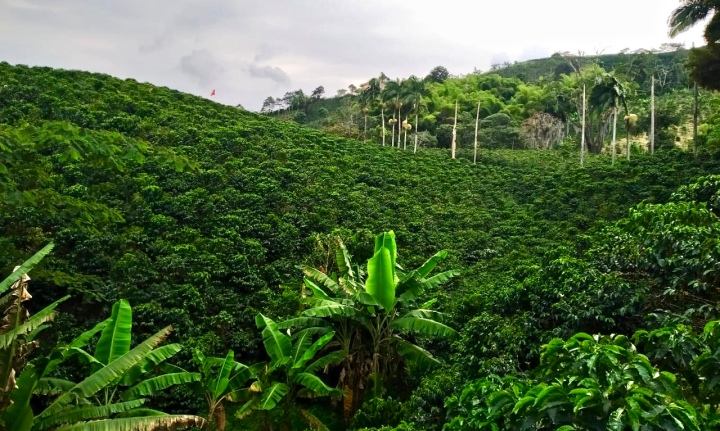This post is based on our recently published journal article Farming in the Face of Uncertainty: How Colombian Coffee Farmers Conceptualize and Communicate Their Experiences With Climate Change in the International Journal of Communication.

Climate change is a real threat to the Colombian coffee supply chain. There are more than 300,000 coffee farmers in Colombia whose livelihoods are being threatened by an increasingly chaotic climate, and the coffee sector in Colombia provides jobs for over 2 million people. However, very little is known about Colombian coffee farmers’ experiences with climate change.
In order to respond to climate change, we need to consider two possible approaches: (1) Mitigation: decreasing greenhouse gas emissions to lessen the intensity of climate change and (2) Adaptation: adjusting human behavior to the current and future changes in the climate due to climate change. We hear a lot about mitigation. However, it’s becoming more important to pay attention to adaptation, as climate change is already happening in parts of the world, such as Colombia. Additionally, we aren’t taking the actions necessary to slow climate change down enough to prevent future impacts. Adaptation will protect communities from food shortages and other climate crises.
Successful adaptation to climate changes depends on the particular impacts of climate change on a region, but also the unique communities within that region and their activities. We conducted research with a particular community – coffee farmers in Colombia – to understand how they conceptualize climate change and how they communicate their experiences with it from their perspective and in their own words. The goal of this type of research is to support future adaptation projects in this region, so they can be tailored to the community’s particular needs.
The Data

We collected our data through interviews of approximately 60–90 minutes with 45 coffee farmers in Risaralda, Colombia. Risaralda is one of Colombia’s 32 departments located in the foothills of the Andes. Risaralda is a coffee-producing area officially known as the Coffee Axis, which forms part of the UNESCO World Heritage Site known as the Coffee Cultural Landscape of Colombia. Our participants were from each of Risaralda’s 14 municipalities, with two to four interviewees from each municipality.
Along with three team members from UTP, I conducted the interviews in Spanish over a two-week period. Participant ages ranged from 30 to 81, with the mean age being 51 years. We began with basic demographic questions, followed by open-ended questions about common challenges farmers face to have a basis of comparison for understanding the impacts of climate change on farmers compared with other types of challenges. We analyzed the data using line-by-line coding (jargon: guided by dimensionalization, which is a grounded theory approach).
Findings
Find a visualization of our findings from our article in the Journal of International Communication (Lambert & Eise, 2020) on page 265.
Through our research we found that Colombian coffee farmers know what climate change is, both as a consequence of human behavior and as a lived experience. They reported experiencing unpredictable seasons and weather, which results in farmers experiencing a lot of uncertainty when making everyday farming decisions. This uncertainty is due to (1) farmers’ inability to plan planting and harvesting based on previous seasonal indicators, (2) increased pests, disease, drought, and extreme weather events on their farms and (3) decreased production exacerbating preexisting financial problems arising from slim profit margins and labor shortages. The farmers shared that they feel that their livelihoods are threatened by climate change, that they must change their farming practices to survive climate change impacts, but that they largely don’t know how.
Conclusions
- Colombian coffee farmers need to be connected with new sources of reliable information in order for them to successfully adapt to climate change.
- The existing financial pressures that compound the impact of climate change on farmers’ financial survival must also be addressed. This situation requires an unprecedented change in how farmers are compensated through the coffee supply chain, either at the farmers’ end of the supply chain through increased profit at their point of sale, or from the opposite end of the chain with increased profit sharing from intermediaries and consumers.
- Adaptation campaigns should clearly link adaptation recommendations to the specific production problems faced by the farming population, as well as to farmers’ grave concerns about profitability.
We need to pay attention to people’s experiences with climate change impacts who live in regions vulnerable to climate change, because these experiences are warning signs of what can be expected as climate change impacts unfold globally.

This article is open-source. Access the original PDF here or in the International Journal of Communication.
